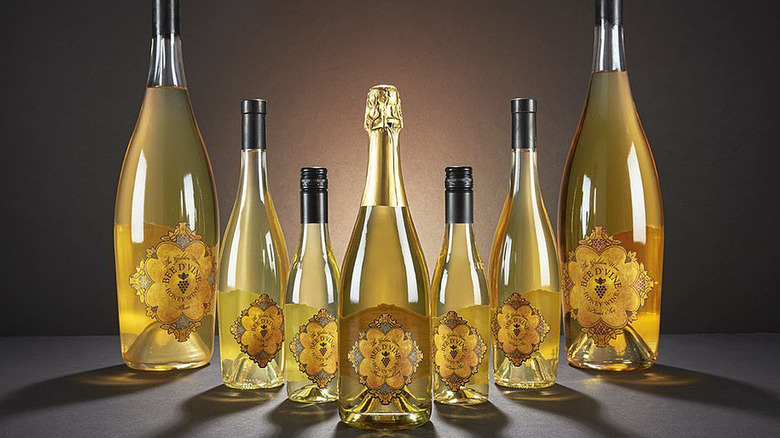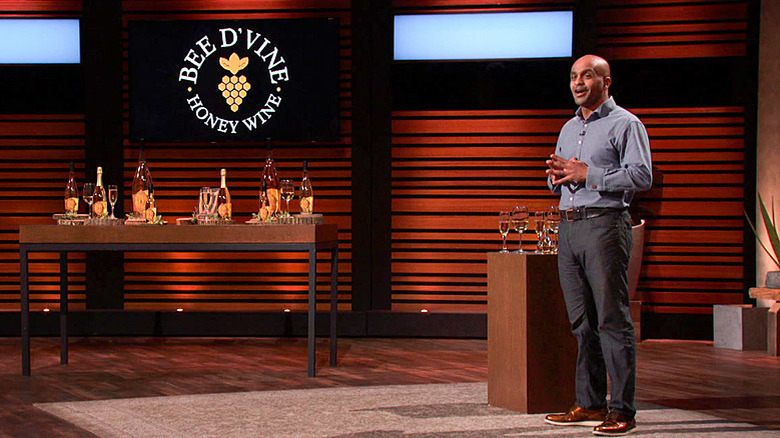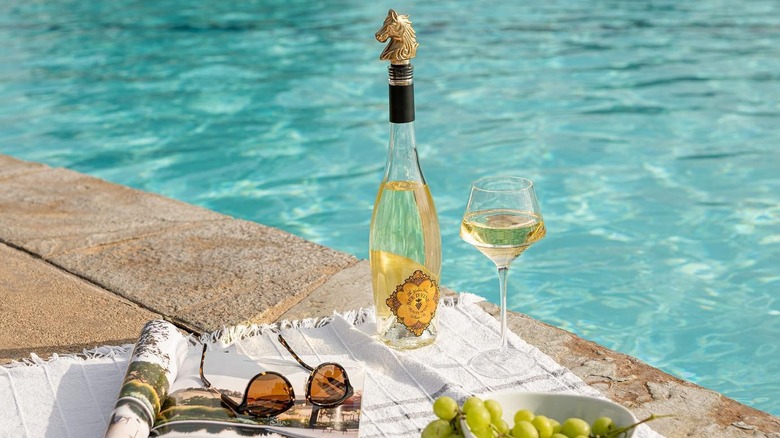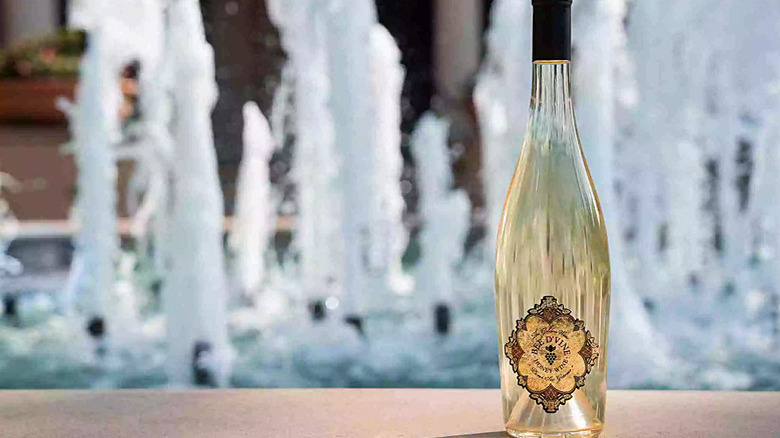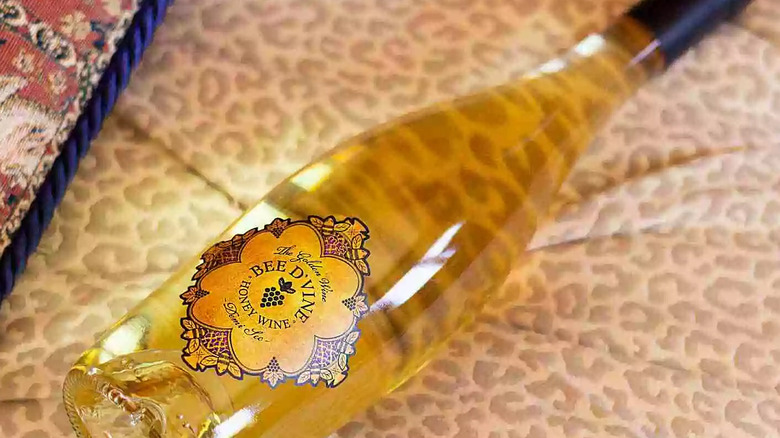Bee D'Vine: Here's What Happened After Shark Tank
We may receive a commission on purchases made from links.
Winemaker Ayele Solomon was born in Ethiopia, grew up in Kenya, and later settled in Sonoma Valley, California, near his father's vineyard. These locations all played their part in inspiring The Honey Wine Company, his business that produces Bee D'Vine honey wine. Also known as mead and often associated with the Vikings, the real history of what mead is goes much farther back. Honey wine is the oldest alcoholic beverage, with roots tracing back to ancient Ethiopia where it is still enjoyed today as t'ej, the country's national drink.
While doing conservation work in Ethiopia's endangered Kafa rainforest in 2009, Solomon came up with a revolutionary plan to save the forest and empower the community. The idea was to use the forest's flowering trees to transition local beekeepers to modern honey production methods, which could reduce clearcutting and the need for irrigation and pesticides. This would create an earth-friendly economic alternative and prevent the die-off of bees in danger of Colony Collapse Disorder.
After five years of experimentation, Solomon developed his first honey wine vintage. In 2014, it was featured on "The Today Show," and in 2019, the company got another promotional boost when Solomon was featured as a Tastemaker in Food & Wine magazine. That same year, he opened the first ever wine-tasting bar in San Francisco's iconic Ferry Building, but unfortunately, the business shut down within a few months due to the COVID-19 pandemic. That was the trigger to apply for a shot on "Shark Tank."
What happened to Bee D'Vine on Shark Tank?
Bee D'Vine appeared on "Shark Tank" on November 13, 2020, in Season 12, Episode 5. Solomon began his pitch by asking for $750,000 for 20% of his business. The Sharks enjoyed trying sparkling and non-sparkling wines, and a brute non-sparkling ... which, in fancy wine shopping vocabulary, simply means "dry."
In six years, the company had made $400,000, with $115,000 in the preceding 12 months. Prices ranged from $39.00 to $49.00, and cost $5.93 per unit. When asked why those figures were so low, Solomon revealed he had been running things himself while holding a full-time job the first five years, and he didn't have a big advertising budget. Robert Herjavec felt the only problem was that if more people would just try it, they would love it. Mark Cuban, however, thought the high price was preventing people from sampling it. Kevin O'Leary noted that the majority of wines sold in the United States cost less than $14.
While O'Leary grilled Solomon about his prices versus the amount sold, the other four Sharks conferred amongst themselves. Eventually, Lori Greiner along with Cuban, Herjavec, and Daniel Lubetzky came forth to offer a rare four-Shark deal for $750,000 with a 40% stake — 10% for each Shark. At first, Solomon attempted to counteroffer, but Cuban quickly shut him down stating that there would be no negotiating. It didn't take much convincing before Solomon happily accepted the deal.
Bee D'Vine after Shark Tank
After the show aired, the company experienced both the positives and the negatives of the "Shark Tank" effect. On the one hand, it received a huge influx of website orders, likely assisted by its discounted "Shark Tank" deal bundle, which included free shipping ... but on the other hand, there were so many orders that the website crashed. Orders kept coming in — although some customers were dismayed by products being sold out while others shared complaints on the company's social media about delayed orders or unexpected substitutions.
Despite all the excitement of the unique four-Shark partnership, the deal ended up not going through (per Wine Enthusiast). While details as to why have not been made public, the business managed to find its own way, as well as recover from its initial shaky post-Tank debut.
The brand's marketing efforts helped expand availability, with the honey wines being sold internationally in Europe and Asia, as well as offered as an in-flight beverage to Africa on Ethiopian Airlines. As Solomon told the airline passenger network, Bee D'Vine is an excellent choice for a high-altitude drink, because "a significant segment of the population doesn't particularly care for the tannins in grape wine" (via APEX). Unlike wine from fermented grapes, honey wine contains no tannins, a compound that contributes to the scientific reason red wine gives people headaches.
Is Bee D'Vine still in business?
Even without "Shark Tank," Bee D'Vine has continued to flourish, and the business celebrated its 10th year anniversary in 2024. It continues to innovate, creating new varieties of what the company's website describes as the "most sustainable wine on Earth." The company helps to support rural beekeepers worldwide, with its honey sourced from tropical forests as well as from closer to home in California. This monetization helps prevent deforestation by discouraging more labor and resource-intensive crops.
There are now 11 different mead products available, with one of the most recent additions being the Bee D'Vine Brut "Fresca" Sparkling Honey Wine released in 2022. The one-of-a-kind wine is double fermented in stainless steel (which sets it apart from the equally unique oak-barrel aged variety), lending it a fresh taste that accentuates its flavors of sage, honeysuckle, rue, and lilac. Along with its sweet, semi-sweet, sparkling, and non-sparkling options, there are also special, limited editions releases. These include a demi-sec made with Geteme honey from the Kafa forest in Ethiopia, and with Miombo honey from the woodlands of Tanzania.
The Honey Wine company also provides two special drinking and bottling options. It sells the oldest kind of drinking vessel called a berelé, which is a short, round flask traditionally used for Ethiopian t'ej. For a true showstopper and impressive conversation piece, the company also produces double magnum three-liter glass bottles known as Jeroboam, which hold the amount of four regular bottles — a whopping 20 glasses worth.
What's Next for Bee D'Vine?
Ayele Solomon's plans have consistently run on track with pursuing his goals of conservation and agricultural sustainability, always with the pursuit of improving the lives of beekeepers (and bees) worldwide. New varietals using unique honeys are constantly in the works, and having taken over management of his father's vineyard, Solomon now also makes his own traditional grape Chardonnay wine called Wancha. As he previously told Wine Spectator, "He's hopeful that wine lovers and fine restaurants will embrace honey wines as a new tipple." Sweet honey mead in particular is one of the best wines to pair with stinky cheeses.
Bee D'Vine has won numerous awards, including gold medals scored in the World Wine Championships, Eco-Friendly Wine Challenge, and International Women's Wine Competition, as well as silver medals in the Finger Lakes International Wine Competition, Sommelier Challenge International, and the International Wine Channel TV Awards. The history and culture of mead are explored in detail in a book Solomon published called "The Celebrated Story of Honey Wine," which won the Gourmand World Winebook award for best wine history book. The company was also featured in SOMM TV's documentary "A Closer Look at Honey Wine & Bees."
The business is a current partner with the network of Bay Area Black-owned wineries and vintners called Black Vines. It continues to offer incentives for new customers with first-time order discounts, as well as a Club d'Vine subscription service with regularly scheduled deliveries and members-only benefits. And, for those with an appreciation for beekeeping and the processes behind-the-scenes, the brand's Instagram has shared videos, pairing suggestions, tips for customers, and updates to operations.
"Shark Tank" is available for purchase on Prime Video.

